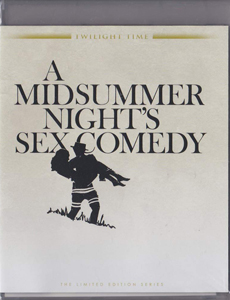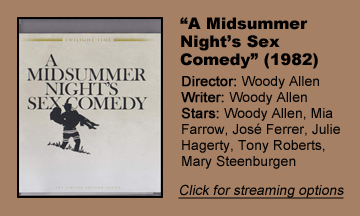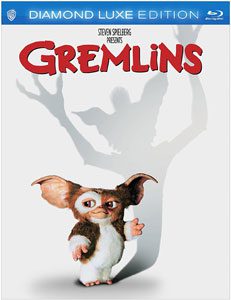“A Midsummer Night’s Sex Comedy” (1982) is a good example of how Woody Allen’s B-game is better than most writer-directors’ B-game, but it also makes me wish it was a better film. It could’ve been a balance between his older farces and his newer relationship dramas, but it leans so much toward the latter that the period and supernatural touches seem superfluous.
A strong cast
The casting is spot-on, with characters easily recognizable in shorthand. Allen is Old World inventor Andrew, with Mary Steenburgen as his demure wife Adrian. Joining them for a summer jaunt at their country home are doctor Maxwell (Tony Roberts, easily spotted as the best friend of the Allen character) and his sexy nurse date Dulcy (“Airplane’s” Julie Hagerty, again delivering funny lines in a deliberate manner).
Rounding out the trio of couples is intellectual professor Leopold (Jose Ferrer, who has airs of Christopher Lee and latter-day Donald Sutherland) and much younger bride-to-be Ariel (Mia Farrow, in the first of her many 1980s Allen collaborations).
Love hexagon
They form an amusing love hexagon that has a lot to say about human behavior in the throes of love, lust, hope, doubt and neuroses. Funny one-liners and scenarios are present.
I like a scene in the quarters of Maxwell and Dulcy. Maxwell is pretending to draw a bath, and on the other side of the closed door, Dulcy is pretending to settle down for a nap. A breeze inches the door open and we see that both are dressing in their finest clothes, preparing to sneak out for other trysts.
Surprisingly tame
I’m surprised “Midsummer” isn’t wackier, like Allen’s political and historical farces “Bananas” and “Love and Death.” It’s actually rather tame, not taking advantage of out-of-time humor. It’s set in an indeterminate place and time in the past, as the kitchen implements are old-fashioned and the women wear corsets.
Web research tells me this is 1906 in upstate New York. Leopold’s university seems fairly modern, though, and everyone’s behavior syncs with 1982. Yet we don’t get funny time-period contrasts like “Love and Death” serves up.
Andrew invents things that require movie special effects to come alive, most notably a da Vinci-esque pedal-powered flying machine and an orb that can see into other dimensions. These magic-realism or fantasy touches are not at all necessary for the story.
It’s certainly amusing to see Andrew in the flying machine, with his old-school leather flight helmet, but there’s no point to it. Maybe I would’ve gotten more out of it if I was familiar with Shakespeare’s “A Midsummer Night’s Dream,” but even so, it’s clear that this film passes on an additional level of humor.
Love makes people do the wacky
It’s content to operate on one level: observing how even straight-laced people can act weird in the throes of love. The most extreme example is the dour Leopold, who we can be certain has never said anything funny in his life – although he probably thinks he says clever things regularly.
Eventually, he becomes smitten with Dulcy, desiring a fling by the river before his marriage to Ariel the next day.
“A Midsummer Night’s Sex Comedy” has decent momentum and services all six characters. It doesn’t say anything not stated in previous Allen movies, and the angle into these statements is only mildly fresh.
This is like the talented-people equivalent of those Adam Sandler comedies where he hangs out with his friends and they act out a thrown-together screenplay.



